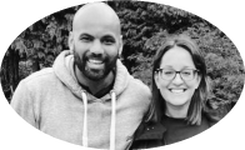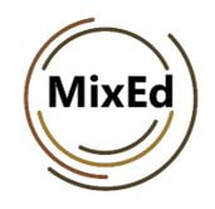|
“Sometimes as a person of mixed race leaves you in the middle or left out completely.”  As part of our Diversity, Equity and Inclusion (DEI) work to raise awareness and continue the conversation about this important agenda, I spoke with Louise Jaunbocus-Cooper, co-founder of MixEd, a platform for educators (and others) to discuss race, racial identity and diversity. MixEd works closely with Diverse Educators, who are leading DEI training across our SWIFT partnership. Mixed heritage is the fastest growing ethnic group in the UK. Mixed race is currently the most under-represented ethnic group in leadership with only 1% of senior leaders of mixed heritage. Founded during the pandemic following the death of George Floyd, MixEd co-founder, Marcus Shepherd contacted Louise in response to her Tweets about her own mixed heritage. Louise has a White-British mother and Mauritian Muslim father and grew up in Oldham in the Northwest and engages in the religious and cultural aspects of her dual heritage – for example, celebrating Easter with her Mum and Eid with her Dad. Whereas, Marcus is a black man of White British and Ghanan heritage who has little contact with his Ghanan family and is immersed in his British family culture. Together, Louise and Marcus believed that they could do something to get their voices across. Exchanges ensued and MixEd as a platform was born that featured their own blogs and with an invitation to other guest bloggers to contribute. The website has evolved from mixed race to intersectionality, including religion and race and sexuality and race. 1. How do you envisage the continued role of education in opening up the conversation about mixed race? Both Louise and Marcus are senior school leaders and value the role of education in providing a space and an understanding about mixed identity. Louise is Deputy Headteacher at Wellington School, a 11 - 18 years school with Academy status in Timperley in Greater Manchester and Marcus is Regional Education Director for E-ACT. I believe it is always important to look at things from an educationalist’s perspective and to consider our outside work persona and how others are treated. Student voice is an essential part of this conversation in education and you can read a powerful blog on the website by Jordan a secondary student of mixed race, sadly, on the fringes of criminality who writes about his experiences and hopes. In my own school, we have looked at decolonisation of the curriculum that required a staff mindset change, beyond a departmental or teacher level as a culture shift about identity. The biggest misconception for me is around the misconception about who you are. I am known as “white passing” because I am still quite fair skinned despite my dual ethnicity that means it stays hidden. People sometimes say things to me - including casual Islamophobia - and do not realise that this is offensive to me. But because I feel that I do not fit into a neat ethnicity space because of the colour of my skin, it does not feel right to be offended. It is the opposite experience for Marcus, as people make misconceptions about his culture due to the colour of his skin and assumptions about his appearance of ethnicity. Assumptions can be based on what people cannot see, which makes it a unique experience for people of mixed race. However, it is significant to note that even people of mixed race are not a homogenous group. They are all very different and with very different lived experiences. I recall an incident when I was a child in McDonald’s in Rochdale with my Mum and brother, who is darker-skinned than me. A lady came up to my Mum and said “How lovely, you’ve got one dark and one white.” It was well-meaning, but clearly inappropriate and growing up in Oldham as a family we were used to overt racism. Part of our MixEd work is providing training in schools to support them on their journey – which starts from reviewing policy to staff training, to the curriculum and we are big on promoting student voice.
In our school, we have a Gender Equality Council who have led awareness campaigns on period poverty, sexism, and gender pronouns. Our Race Equality Council Year 8 students led a thought-provoking assembly on afro-textured hair and talked about the history of hair discrimination dating back to the Transatlantic slave trade and will be leading a future assembly on micro aggressions. Whilst the LGBTQIA+ Council has looked at gender pronouns and making schools safe for transgender students. “As Educationalists, you could say that we have the most important role to influence the future generation.” 2. Are you optimistic in our Black Lives Matter era? Yes, I am optimistic that education is proactive in the post-George Floyd Black Lives Matter sphere and has galvanised thinking. But we need to do more. A growing number of Schools and Multi Academy Trusts are approaching MixEd. So, there is lots of hope of positive change and young people are brilliant. However, I am mindful of the recent Met Police report and blatant racism that was very disheartening, which I believe has a lot to do with the institutional structures. I also worry about immigration rhetoric and racism in certain areas of the country that is polarising one group against another and is often used as a weapon against people. See the recent issues about immigrants in Liverpool. So, there is wider work to be done. 3. What do you consider to be the success (es) of Mix-Ed to date? Quite simply, but significantly, MixEd is a platform that amplifies the voices of people of mixed race and as part of our work, Marcus and I meet some amazing people who want to work with us and we are proud to be the trailblazers in this work. Our collaboration with Diverse Educators is another important space for us and we are grateful for the opportunities provided to us. 4. What are your personal gains in leading Mix-Ed? Huge! Marcus and I are “very, very proud on a personal level” of what we have created today that was conceived from a chance chat on Twitter. It still blows me away how many new wonderful people we meet who are passionate and engaged and want the same things as us and that we can help to make them feel safe. It also affirms a sense that the world is a good place – especially, if and when, you read the doom and gloom on social media. “It heartens me and keeps me going and we can only impact what we can impact.” 5. Looking to the future, what are your main aims for Mix-Ed? The big one is to allocate some more time to MixEd from next year. We will be relaunching the website and will be offering low-cost training to help retain and recruit minority ethnic staff to help support the recruitment crisis in the teaching profession; especially as so many people of mixed identity say that they do not see themselves represented on the staff body. We will also be offering a coaching model from September to coach Early Career Teachers and aspiring senior leaders. And finally, we want others to continue to join us and to feel safe in their mixed identity. We thank Louise and Marcus for sharing their experiences and for their ongoing MixEd work in providing a safe space for others of mixed ethnicity and identity and may it continue to be rewarding, as well as successful. Interview by Jude Owens, PA to the SWIFT Executive Team
0 Comments
Your comment will be posted after it is approved.
Leave a Reply. |
SWIFT News
|
SPONSORED BY
Join us, be a part of our SWIFT community |
© COPYRIGHT 2022 SOUTH WEST INSTITUTE FOR TEACHING SWIFT. ALL RIGHTS RESERVED | Website by brightblueC
VIEW OUR PRIVACY NOTICES | VIEW OUR COURSE T&CS
VIEW OUR PRIVACY NOTICES | VIEW OUR COURSE T&CS


 RSS Feed
RSS Feed





